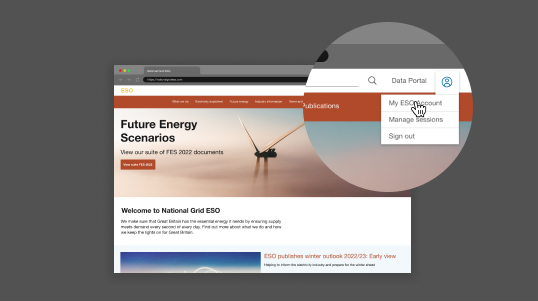
Top Five Takeaways from COP26
17 Nov 2021 - 3 minute read
It’s hard to overstate the significance of COP26 in the fight to tackle climate change. The energy system transformation needed to achieve net zero was one of the key subjects under discussion. With National Grid Group as principal partners, the Electricity System Operator had a strong presence, sharing the wealth of our technical insight on the matter, and demonstrating how we’re leading the way with energy decarbonisation.
Now that COP26 has finished, I want to share some of the highlights from the conference, both for me personally and for the ESO.
Rising to the challenge, not debating its existence
Looking back at the Paris Agreement in 2015, there wasn’t a shared understanding on the scale and severity of the climate crisis, or even whether it was a real issue.
At COP26 by comparison, there was a step change in this respect. From the moment I arrived – the atmosphere, the talks and their outcomes, the people I spoke to – all the focus was on recognising and tackling the specifics of climate change. The overarching impression was an encouraging one: for the first time, the international community is rallying with shared purpose to find answers to these global challenges.
Alignment on the engineering challenges
This provided the foundation for us to deeply consider the engineering solutions necessary to operate a zero-carbon energy system in Britain.
In our Future Energy Scenarios, we highlight the need to significantly increase GB’s electricity storage capacity in order to decarbonise the system. It was encouraging that in all the sessions that I attended and spoke at, there was widespread agreement with the ESO’s view of long-duration energy storage (LDES). To balance the system, our Zero Carbon Operability team is overseeing analysis of the potential for LDES to alleviate network constraints. We’ll continue to provide insight that will inform the way forward as the industry tackles the engineering challenges to achieve this.
The role of the consumer
We shouldn’t overlook the huge opportunity to build flexible demand into the energy system of the future, using load shifting to flatten out the peaks and troughs.
Consumers are increasingly comfortable bringing smart technologies into their homes, with all the convenience that they offer. They also create easy ways for consumers to engage with the system transformation, for example via devices that automatically switch on and off based on the availability across the Grid – from washing machines to car chargers. Vehicle to grid technology is another example of how engaging with consumers can help to reduce peak demand.
Inclusion and diversity
The problems surrounding global warming affect people from all walks of life, so no one group of people has all the answers. The fundamental changes we need to bring to our societies require an equally broad set of talents and perspectives to be reflected in decision making and implementing the solutions, so it was encouraging to hear that this was a recurring theme throughout COP26.
The ESO is dedicated to bringing this to life. As Chair of the ESO’s Belonging Forum, it’s a priority for me that we continue to create a truly inclusive business. I was delighted to see National Grid awarded ‘Outstanding Employer’ at the Ethnicity Awards recently. It’s just one of the ways we recently. It’s a great example of how we’re dedicated to attracting the best minds and valuing every colleague’s contribution as we lead the way to a decarbonised system.
ESO’s global leadership
My COP highlight has to be watching the ESO’s Executive Director host the GPST session at the U.S. Center in the Blue Zone. Fintan Slye sharing the floor with US Energy Secretary Jennifer Granholm and CEOs from other system operators was a visible demonstration of the ESO’s international standing.
It was also great to see colleagues from across the ESO presenting technical sessions, moderating forums and shining a light on our future plans for innovation and collaboration.
The commitments made at COP26 demonstrate progress, though the outcome of 2.4C shows that much more needs to be done. The ESO is already leading the way in our field. GB has the fastest decarbonising energy system in the world. We’ve reduced carbon intensity by 66% since 2013; coal is now less than 1% of our energy mix, down from over 50% ten years ago. This gives me confidence, not only in the ESO’s ability to revolutionise GB’s energy system, but to play a leading role in transforming systems globally.
